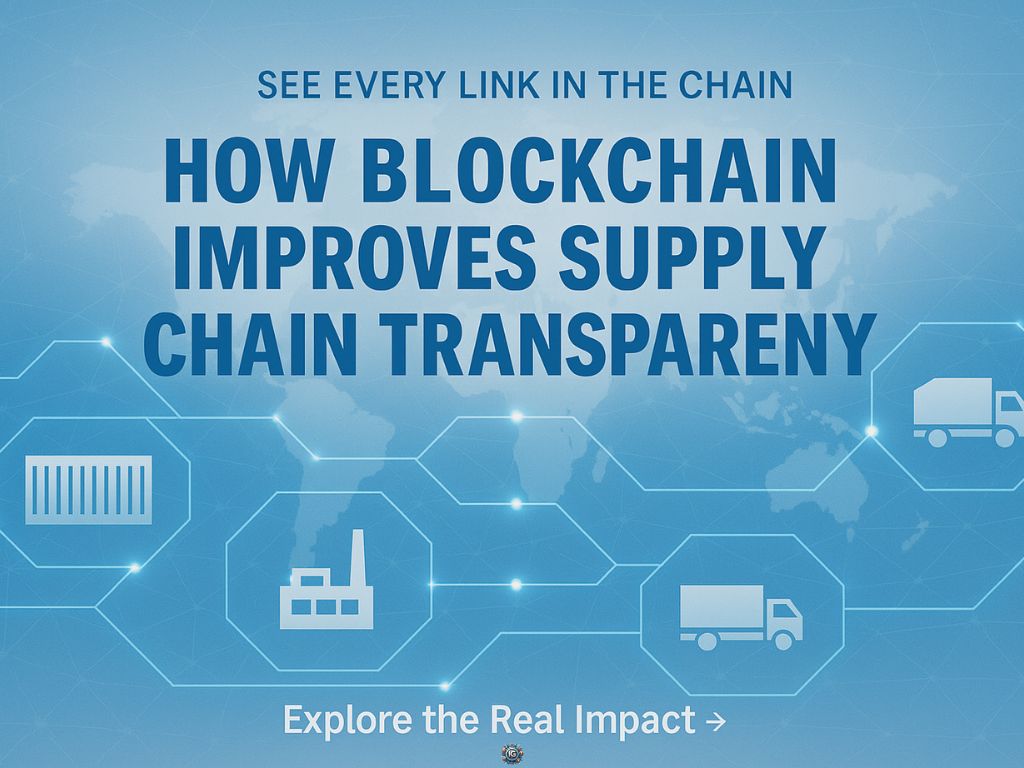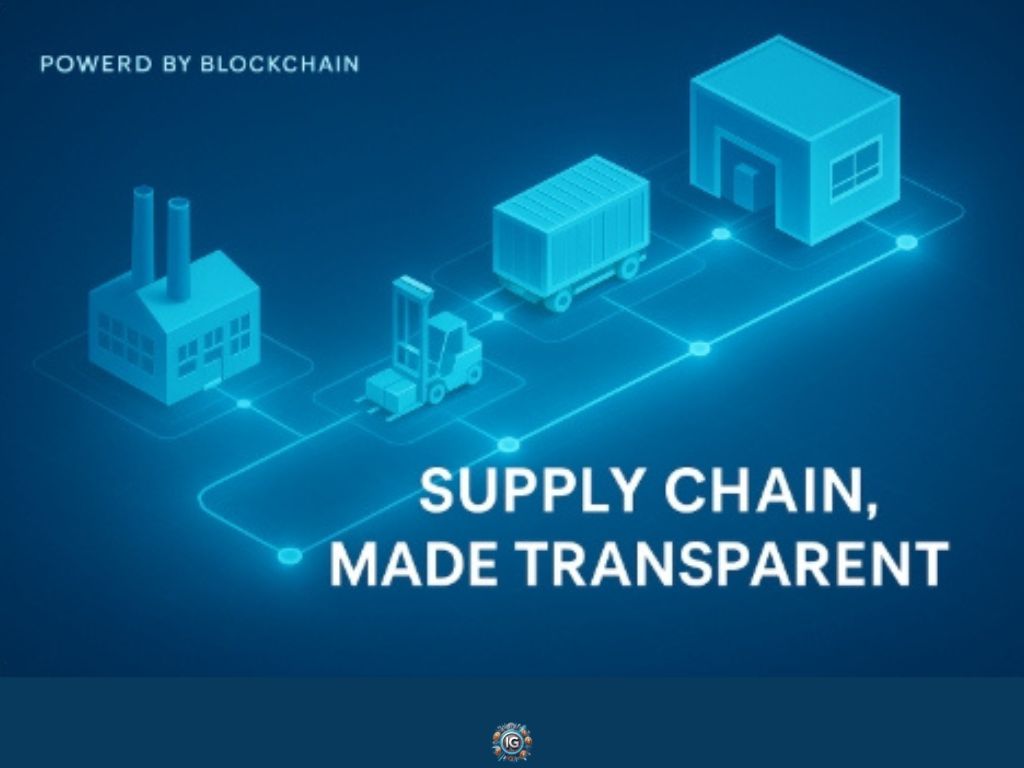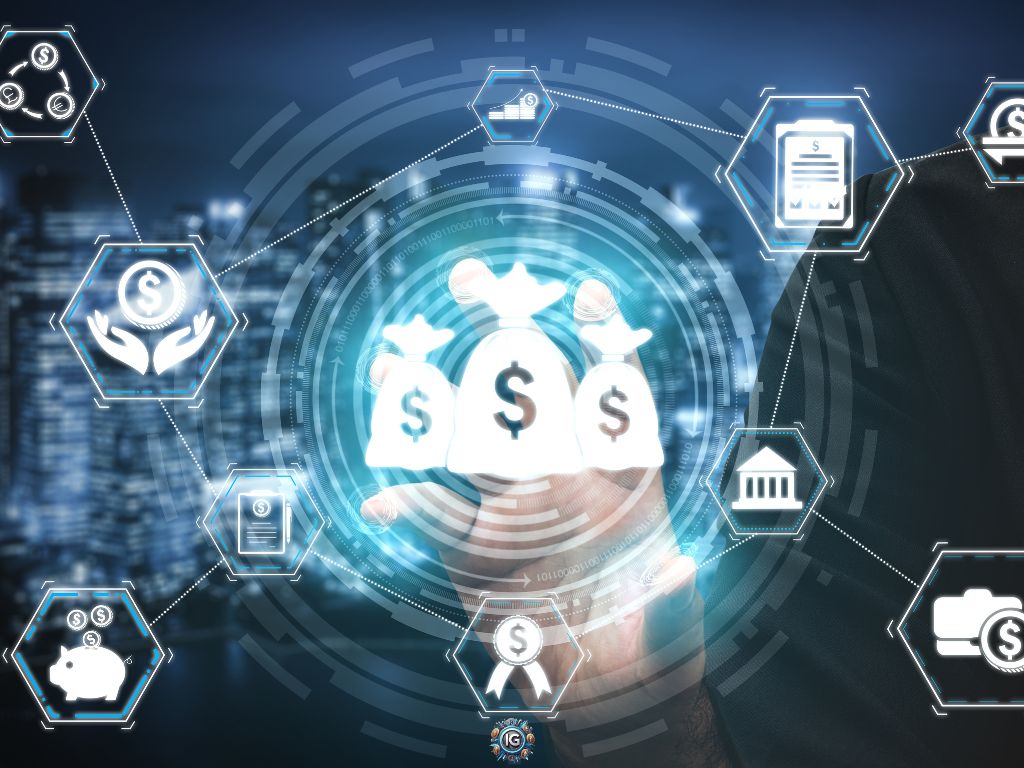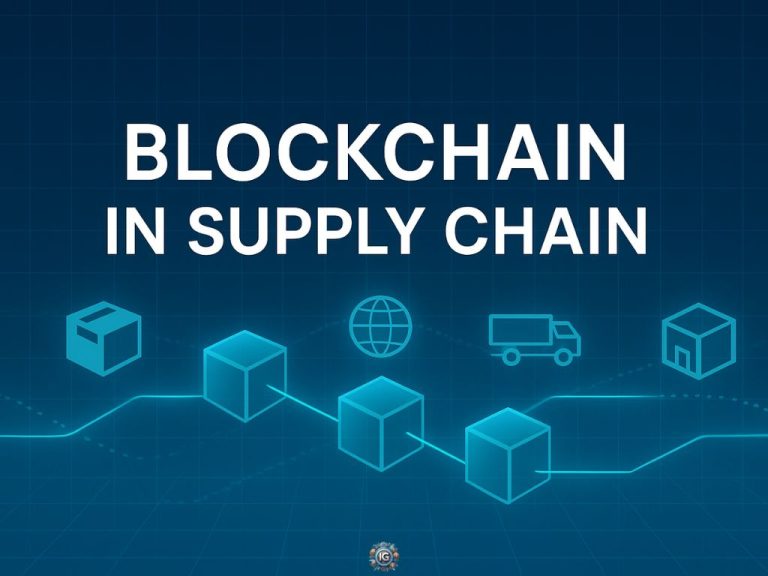Introduction
Blockchain in supply chains refers to the use of decentralized ledger technology to record, verify, and share data across every stage of the supply chain process — from sourcing materials to delivering finished products.
This allows companies to track goods in real time, prevent fraud, and eliminate costly inefficiencies by ensuring all parties operate from a single, tamper-proof source of truth.
Modern supply chains are notoriously complex and fragmented. Traditional systems rely on siloed databases, manual records, and third-party audits, making it difficult to verify transactions, trace issues, or maintain transparency across suppliers, manufacturers, and logistics partners.
Blockchain changes that.
By replacing fragmented data with a shared, immutable ledger, blockchain introduces trust, traceability, and automation at every level of supply chain operations.
It’s already being adopted by major players across food, pharma, manufacturing, and logistics — and it’s setting a new global standard.
In this guide, we’ll break down how blockchain works in supply chains, the real-world benefits it delivers, challenges to consider, and how businesses can get started.
Key Takeaways
- Blockchain in supply chains allows for real-time tracking, improved data accuracy, and end-to-end visibility without relying on third parties.
- It enhances trust and traceability by recording every transaction on a tamper-proof, shared ledger.
- Companies can reduce fraud, counterfeiting, and delays by automating verification and eliminating manual record-keeping.
- Industries like food, pharma, automotive, and logistics are already deploying blockchain to improve efficiency and compliance.
- Implementation requires technical planning, stakeholder alignment, and choosing the right blockchain platform for your supply chain needs.

Blockchain Fundamentals for Supply Chain Management
To understand how blockchain is transforming supply chains, you first need to grasp what makes the technology fundamentally different from traditional databases and record-keeping systems.
At its core, blockchain is a distributed digital ledger — a system that records transactions across a network of computers rather than storing them in a single, centralized location. Once data is recorded, it’s extremely difficult to alter. This built-in immutability creates trust between parties who may not fully trust each other.
Now let’s break down the key concepts.
What Is Blockchain in Supply Chain?
In the context of supply chains, blockchain is used to capture and share information at every step of a product’s journey — from raw material sourcing to final delivery. Each transaction (e.g., a shipment, inspection, or customs clearance) is recorded as a block, time-stamped, and added to a continuous chain of verified data.
Key concepts include:
- Distributed Ledger: All participants (e.g., suppliers, manufacturers, shippers) have access to the same data in real time.
- Immutability: Once recorded, data cannot be changed without consensus, ensuring transparency and auditability.
- Consensus Mechanisms: These are protocols that verify transactions before they’re added to the ledger, removing the need for third-party validators.
This makes blockchain ideal for environments where many entities interact, trust is limited, and accuracy is critical — exactly the conditions most supply chains operate under.
How Blockchain Differs from Traditional Databases
Traditional supply chain systems are often centralized and fragmented. Each stakeholder uses their own database, which means information is siloed, duplicated, and vulnerable to manipulation or loss.
Blockchain solves this with:
- Decentralization: No single party controls the data; it’s distributed across a network.
- Auditability: Every transaction is traceable and permanently recorded, creating a full chain of custody.
- Tamper Resistance: Once entered, data cannot be altered without triggering alerts across the system.
In short, blockchain doesn’t just store supply chain data — it verifies, secures, and synchronizes it in a way traditional systems can’t.
Top Benefits of Applying Blockchain to Supply Chains
Integrating blockchain into supply chains isn’t just a technological upgrade — it’s a structural improvement in how data, trust, and operations flow across global networks.
From traceability to cost savings, blockchain addresses some of the most persistent pain points in supply chain management.
Let’s break down the most impactful benefits.
Enhanced Traceability & Provenance
Blockchain creates a transparent, time-stamped record of every event in the supply chain — from the origin of raw materials to the final delivery of finished products. Each transaction is added to the ledger in sequence, creating a permanent audit trail.
This allows companies to:
- Instantly trace defective products or contamination sources
- Authenticate the origin of goods (e.g., ethically sourced materials)
- Increase consumer trust through visible product histories
In industries like food, fashion, and electronics, knowing where something came from — and proving it — is now a competitive advantage.
Improved Security & Fraud Reduction
Traditional supply chains are vulnerable to counterfeit products, false documentation, and data manipulation. Blockchain’s cryptographic structure makes this far harder.
How?
- Data is tamper-evident — any attempt to alter a transaction is immediately flagged
- Every participant sees the same, verified data in real time
- Counterfeit goods are easier to detect and remove from the system
This level of shared truth makes fraud not just difficult — it makes it obvious.
Operational Efficiency & Cost Savings
Blockchain helps eliminate the slow, manual processes that clog up global logistics — especially in document-heavy industries like shipping or pharma.
Benefits include:
- Automated reconciliation of orders, invoices, and shipments
- Faster customs clearance through verifiable documentation
- Reduced overhead by eliminating intermediaries and redundant audits
The result: fewer disputes, faster settlements, and leaner, more agile supply chains.
Better Regulatory Compliance
With blockchain, companies can provide regulators with real-time access to verifiable data — reducing compliance risk and audit delays.
Key use cases:
- Meeting food safety standards with traceability logs
- Verifying drug authenticity and temperature control in pharma
- Proving ethical sourcing in apparel and mining industries
By embedding compliance into the system itself, blockchain helps companies avoid fines, delays, and reputational damage.

Blockchain in Supply Chains: Key Use Cases Across Industries
The benefits of blockchain aren’t theoretical — they’re already being realized across multiple industries with complex, high-stakes supply chains.
From food safety to counterfeit prevention, blockchain is helping companies bring clarity, speed, and trust to operations that were once opaque.
Here’s how it’s being used today:
Food & Agriculture
Freshness, safety, and origin matter more than ever in the food supply chain — and blockchain delivers all three.
By logging every step of a product’s journey — from farm to fork — companies can:
- Trace contamination sources in seconds, not days
- Ensure proper storage and transport conditions
- Prove organic or ethical certifications with hard data
Walmart, for example, uses blockchain to track leafy greens, reducing traceability time from 7 days to 2.2 seconds.
Pharmaceuticals & Healthcare
Counterfeit drugs cost the industry billions — and put lives at risk. Blockchain offers a new level of drug traceability and cold-chain compliance.
Use cases include:
- Verifying drug authenticity at every checkpoint
- Tracking temperature-sensitive shipments in real time
- Ensuring compliance with health regulations and serialization laws
Companies like Pfizer and Moderna are exploring blockchain to safeguard vaccine distribution.
Automotive & Manufacturing
With thousands of parts and suppliers, automotive supply chains are notoriously difficult to audit. Blockchain helps:
- Authenticate components and suppliers
- Track warranties and maintenance histories
- Improve recall speed and precision
It ensures part integrity from assembly line to after-sales service.
Retail & Consumer Goods
Today’s consumers want more than fast shipping — they want transparency. Blockchain can verify:
- Ethical sourcing of materials (e.g., conflict-free diamonds, fair-trade cotton)
- Authenticity of luxury goods and fashion
- Provenance of sustainable or limited-edition items
This builds trust and reduces costly returns and disputes.
Logistics & Shipping
Global shipping involves mountains of paperwork, customs processes, and disconnected systems. Blockchain simplifies this by:
- Digitizing documents like bills of lading and certificates of origin
- Allowing border agents and customs officials to verify shipments instantly
- Reducing shipment delays, fraud, and paperwork errors
The Maersk-IBM platform “TradeLens” already connects over 100 supply chain partners using blockchain to streamline ocean freight.
Technical Challenges & Considerations
While blockchain offers powerful advantages for supply chains, implementing it at scale isn’t plug-and-play. Like any emerging technology, it comes with trade-offs — from performance limitations to integration complexity.
Here are the most critical technical and strategic hurdles companies must consider before adopting blockchain in their supply chains:
Scalability & Throughput
Supply chains generate massive volumes of transactions — and public blockchains aren’t built for high-speed, high-frequency data processing.
Challenges include:
- Slow transaction speeds on public networks like Ethereum
- High costs per transaction (especially during network congestion)
- Latency concerns in real-time tracking applications
Solutions are emerging (e.g., Layer 2 scaling, private blockchains), but performance remains a top concern for global implementations.
Interoperability & Standards
Supply chains rarely operate in silos — they involve dozens of systems, platforms, and data formats. Blockchain must fit into this fragmented ecosystem.
Key issues:
- Lack of universal standards between blockchain protocols
- Difficulty integrating with legacy ERP, WMS, or EDI systems
- Limited cross-chain data sharing across different networks
Without interoperability, blockchain risks becoming just another silo — defeating its purpose.
Data Privacy & Permissioning
Blockchain’s transparency is a strength — but in supply chains, not all data should be public.
Considerations include:
- Protecting sensitive commercial data (e.g., pricing, sourcing)
- Complying with data regulations (like GDPR or HIPAA)
- Managing permissions so each stakeholder sees only what’s relevant
Permissioned (private or consortium) blockchains often solve this, but require more complex governance structures.
Stakeholder Buy-In & Governance
Blockchain is not just a tech project — it’s a network collaboration. Without broad participation, its value drops significantly.
Barriers include:
- Convincing competitors or partners to share data
- Aligning incentives between parties with different goals
- Defining who controls access, upgrades, and dispute resolution
The hardest part isn’t building the blockchain — it’s governing it across multiple organizations.
By addressing these realities head-on, businesses can plan for long-term success — not just proof-of-concept wins.

Integrating Blockchain with Emerging Technologies
Blockchain brings trust and transparency to supply chains — but when it’s paired with technologies like IoT, AI, and cloud infrastructure, the result is far more powerful: automated, intelligent, and fully auditable supply ecosystems.
Here’s how blockchain collaborates with the next generation of tech:
IoT for Real-Time Data Capture
IoT devices — like GPS trackers, temperature sensors, and RFID tags — play a vital role in feeding accurate, real-time data into the blockchain.
Use cases include:
- Monitoring cold-chain compliance for pharmaceuticals or perishables
- Tracking location, humidity, and shock exposure in transit
- Automatically logging condition data onto a blockchain ledger
This creates a trusted digital thread between the physical world and the supply chain record — reducing manual entry errors and data disputes.
AI & Predictive Analytics
Blockchain ensures that the data used by AI is verifiable and trustworthy, making forecasts more accurate and decision-making more reliable.
Examples include:
- Forecasting supply and demand using clean blockchain data
- Optimizing routing and logistics based on verified historical trends
- Detecting anomalies or fraud by analyzing blockchain transaction patterns
With trusted data as fuel, AI becomes a much more strategic tool for supply chain optimization.
Cloud & Edge Computing
Storing and accessing blockchain data at scale requires robust, scalable infrastructure — which is where cloud and edge computing come in.
Benefits include:
- Faster access to blockchain data across global locations
- Resilience in case of system failure or regional outages
- Support for hybrid deployments (on-premises + cloud)
Edge computing also enables localized decision-making, reducing latency for time-sensitive supply chain actions.
These integrations elevate blockchain from a secure ledger to a central nervous system for smart supply chains.

Choosing the Right Blockchain Platform
Not all blockchains are created equal — especially when it comes to supply chain use cases. Choosing the right platform can determine whether your blockchain initiative improves efficiency or becomes an expensive, underused experiment.
Here’s what decision-makers need to consider:
Public vs. Private vs. Consortium Blockchains
The first decision is architectural: who can access and participate in your blockchain network?
- Public Blockchains (e.g., Ethereum): Open to anyone. High transparency and decentralization but slower performance and higher costs. Rarely used for enterprise supply chains due to privacy concerns.
- Private Blockchains: Controlled by a single organization. High speed and privacy, but low decentralization. Suitable for internal tracking or enterprise pilot programs.
- Consortium Blockchains: Shared among multiple trusted partners. Balances privacy with collaboration. Best fit for multi-stakeholder supply chains (e.g., manufacturers, logistics providers, and regulators).
Leading Enterprise Frameworks
Several blockchain platforms have been purpose-built or customized for enterprise supply chain use:
- Hyperledger Fabric: Modular, permissioned blockchain ideal for private enterprise use. Backed by IBM and Linux Foundation. Strong in manufacturing and logistics.
- R3 Corda: Originally built for finance, now used in trade and supply chain. Focuses on interoperability and legal contract enforcement.
- Ethereum Enterprise Alliance (EEA): Adapts Ethereum for enterprise with added privacy and performance layers. Offers smart contract flexibility but still maturing in supply chain adoption.
- TradeLens (by IBM and Maersk): Blockchain-based shipping platform that connects shippers, ports, customs, and carriers to streamline global trade documentation.
Selection Criteria
When evaluating platforms, businesses should focus on:
- Performance & Scalability: Can it handle your data volume and speed requirements?
- Privacy & Permissioning: Does it allow selective data visibility across stakeholders?
- Developer Ecosystem & Support: Are there tools, libraries, and partners available to help build and maintain your solution?
- Ecosystem Adoption: Are your partners, competitors, or regulators already using it?
Ultimately, the best blockchain platform is the one that aligns with your supply chain complexity, collaboration model, and long-term goals.

Roadmap for Implementation
Understanding blockchain’s potential is one thing. Implementing it across a supply chain is another — and the transition needs to be deliberate, strategic, and staged.
Here’s a realistic, step-by-step roadmap to help companies move from exploration to enterprise adoption.
Proof of Concept to Full Deployment
Start small. Prove value. Then scale.
- Identify a high-impact use case — e.g., traceability in a single product line, or invoice reconciliation between a few partners.
- Build a prototype or Proof of Concept (PoC) — test on a limited scale with real data and real users.
- Evaluate technical performance and business impact — did it reduce errors, speed up processes, or cut costs?
- Get stakeholder feedback — both internal and external.
- Scale gradually — expand across business units, geographies, or supply chain tiers in phases.
Many failed blockchain projects skipped steps. Start lean, prove results, then expand.
Smart Contract Design Best Practices
Smart contracts automate business logic — but if poorly designed, they can introduce risk.
Best practices include:
- Clarity: Ensure logic reflects real-world contract terms and is understandable to all parties.
- Modularity: Design smart contracts in upgradable components.
- Security Audits: Have contracts professionally audited to detect bugs or exploits.
- Fail-safes: Build in recovery paths or overrides for exceptions and edge cases.
Think of smart contracts not as “code that runs,” but digital agreements that must stand up in the real world.
Measuring ROI & Key Metrics
Blockchain won’t be a silver bullet unless it delivers measurable value.
Here’s what to track:
- Traceability KPIs: Time to track an item’s origin or status
- Error Reduction: Fewer disputes, mislabeling, or fraud incidents
- Time Savings: Faster reconciliation, customs clearance, or audits
- Cost Reduction: Less manual work, fewer intermediaries
- Compliance Metrics: Automated report generation, audit-readiness
Over time, blockchain ROI grows as data accuracy, trust, and automation compound across the supply chain.

Real-World Case Studies
Blockchain in supply chains isn’t experimental anymore — it’s operational. Leading companies across industries are already using blockchain to solve real problems, gain transparency, and create measurable improvements.
Here are three standout examples:
Walmart’s Food Traceability with Hyperledger Fabric
Walmart partnered with IBM to launch a blockchain-based food traceability system using Hyperledger Fabric. The goal? Drastically reduce the time it takes to track produce back to its source.
- Result: Tracing mangoes from farm to shelf went from 7 days to 2.2 seconds
- It increased transparency, improved recall response times, and set a new standard for food safety
- Walmart now requires select suppliers to participate in its blockchain network
De Beers’ Diamond Provenance System
De Beers developed a blockchain platform called Tracr to trace the lifecycle of diamonds from mine to market. The objective was to verify ethical sourcing and authenticity — a major concern in the diamond industry.
- Tracr records each diamond’s unique ID, origin, and ownership changes
- Helps eliminate conflict diamonds from the supply chain
- Increases consumer trust in luxury products by proving provenance
Maersk & IBM’s TradeLens Shipping Platform
One of the most ambitious blockchain logistics projects to date, TradeLens connects over 100 stakeholders in the global shipping ecosystem, including ports, customs agencies, and freight companies.
- Enables real-time access to documents, shipment data, and customs approvals
- Reduces paperwork delays and supply chain blind spots
- Used by giants like Maersk, MSC, and Hapag-Lloyd to streamline container shipping
These examples prove that blockchain in supply chains is not a theory — it’s a competitive advantage, and it’s already transforming how global trade is executed.

Future Trends & Outlook
Blockchain in supply chains is still evolving — and what’s coming next will expand its impact far beyond transparency and traceability. As adoption grows, so does innovation across standards, tokenization, and global regulation.
Here’s what to watch in the coming years:
Global Standards & Interoperability Efforts
One of the biggest hurdles today is fragmentation: different platforms, data formats, and protocols. But initiatives are now underway to create interoperable frameworks that allow blockchain networks to talk to each other.
- Organizations like the GS1, WTO, and World Economic Forum are driving standardization
- Cross-chain communication (interoperability) will allow for broader ecosystem collaboration
- Standard APIs will make integration with legacy systems easier and more scalable
Once interoperability is solved, blockchain will become infrastructure, not just a tool.
Asset Tokenization in Supply Chains
Tokenization — the process of turning physical assets into blockchain-based digital tokens — is gaining traction.
In the supply chain context:
- Companies can tokenize goods-in-transit, raw materials, or even carbon credits
- Tokens can represent ownership, location, value, or condition
- This enables real-time settlement, automated financing, and dynamic insurance models
Supply chains won’t just be transparent — they’ll become programmable.
Evolving Regulations & Adoption Drivers
Governments and regulatory bodies are catching up — and in many cases, pushing adoption forward.
- Customs authorities are piloting blockchain-based clearance systems
- FDA and EU regulators are exploring it for pharma traceability
- Environmental compliance is driving blockchain adoption in carbon tracking and ESG reporting
As compliance requirements grow more complex, blockchain will shift from “nice-to-have” to “non-negotiable” in regulated industries.
The future of blockchain in supply chains isn’t speculative — it’s already unfolding. The next few years will separate passive observers from early movers who gain the most from this transformation.

Frequently Asked Questions
What is blockchain in supply chain management?
It’s the use of blockchain technology to record, track, and share data across every step of the supply chain. Each transaction or event is stored in a tamper-proof digital ledger, improving transparency, traceability, and trust between parties.
Which blockchain platform is best for supply chains?
There’s no one-size-fits-all answer. Popular platforms include Hyperledger Fabric (modular, permissioned), R3 Corda (strong in finance and trade), and Ethereum Enterprise (flexible smart contracts). The best choice depends on your privacy needs, scale, and stakeholder structure.
Who is using blockchain in supply chains today?
Major companies like Walmart, Maersk, De Beers, and Pfizer have implemented blockchain for food traceability, shipping logistics, diamond authentication, and pharmaceutical safety. Adoption is expanding rapidly across agriculture, retail, healthcare, and manufacturing.
What are the main risks and challenges of using blockchain?
Common challenges include scalability, integration with existing systems, data privacy, and achieving buy-in from supply chain partners. Choosing the wrong platform or over-engineering the solution can also slow adoption.
Can blockchain networks be hacked?
While no system is 100% secure, blockchain networks are extremely resistant to tampering. Their decentralized nature and cryptographic security make it very difficult to alter or falsify data. That said, smart contract bugs, endpoint vulnerabilities, or poor governance can still pose risks.
What’s the future outlook for blockchain in supply chains?
The future is bright — especially as interoperability improves, tokenization expands, and regulatory clarity increases. Blockchain is evolving from a transparency tool to a foundational layer for global trade infrastructure.

Conclusion
Blockchain is no longer just a buzzword — in supply chains, it’s becoming a competitive necessity.
By enabling real-time visibility, reducing fraud, and creating a shared source of truth, blockchain solves some of the most persistent challenges in global logistics. From food safety to counterfeit prevention, companies across industries are proving that secure, transparent supply chains are not only possible — they’re profitable.
But success doesn’t come from plugging in a new system overnight. It requires strategic planning, the right platform, and aligned stakeholders. Start with a clear use case, test it in the real world, and scale from there.
The sooner you explore how blockchain can fit into your supply chain, the sooner you gain control over what used to be blind spots — and turn them into a source of trust, speed, and operational edge.
Want to go deeper? Explore whitepapers, check platform case studies, or connect with blockchain supply chain consultants who can help you pilot your first solution.
Next: read our Blockchain Technology Guide.
Disclaimer: This blog post is for informational purposes only and should not be considered financial advice. I am not a licensed financial advisor, and you should always do your own research or consult a professional before making any financial decisions. Cryptocurrencies are volatile and involve significant risk of loss. Past performance is not indicative of future results.


1 thought on “Blockchain in Supply Chain: Transparency and Efficiency”